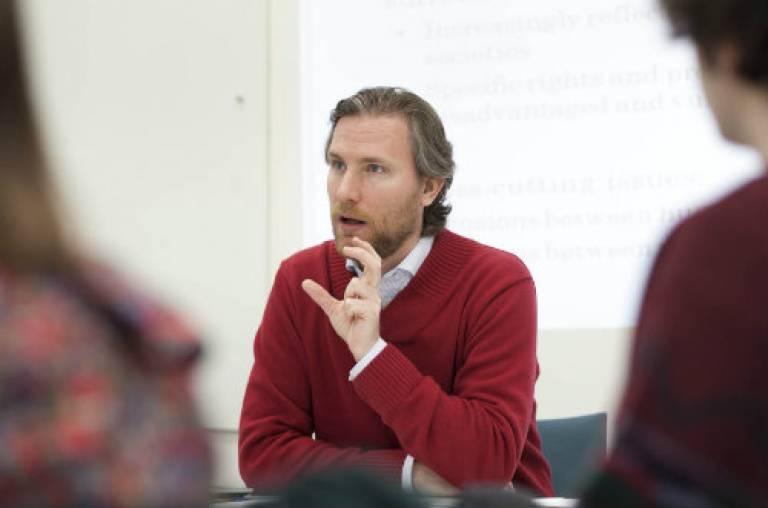Q&A with Dr Par Engstrom
27 May 2016

Dr Par Engstrom is Chair of Teaching and Programme Director for the MSc in International Relations of the Americas in the UCL Institute of Americas.
What are you working on at the moment?
I am Chair of Teaching in a small and collegiate department where our lecturers come from across the world: from Wales to Colombia. All teaching staff are part of our teaching committee and this allows us to benefit from a diverse pool of experience and a plurality of disciplinary approaches to teaching. All teaching staff take part in our peer review system which involves an annual peer observation of a teaching session. We find this promotes personal, as well as professional, development in a fairly informal setting.
As Programme Director, I work in an exciting teaching environment with students from the Americas, Europe and Asia. Students come with a keen interest in the breadth of subject expertise within the Institute. We are currently developing a new undergraduate programme for 2018 which focuses on the history and politics of the Americas and capitalises on the interdisciplinarity of our department. We hope to build on the strengths of our expertise and links with departments across UCL, including Anthropology, History and Politics.
What advice would you give to someone looking to develop the way they teach?
Personally, I find our approach to peer observation very rewarding. There's always something you can learn from colleagues and often it’s helpful to reflect on how what you observe might work with the students you teach yourself. It is also important I believe to regularly take time for self-reflection on your own teaching to understand what works well and what might not. This is particularly important as academic fields develop very quickly.
As a close-knit department, we also encourage learning partnership between staff and students. We learn from the feedback we receive as well as our survey results and actively encourage opportunities for collaborative discussion and reflection.
Lauren Hawkridge (Postgraduate Programmes Officer) adds:
Student satisfaction and learning is at the centre of our activities at the Institute of the Americas and we recognise the vital importance of feedback and endeavour to engage with and respond to our prospective, current and alumni students. This has proven intrinsic in defining the continuous development of the Institute.
Following the announcement of UCL’s participation in the Postgraduate Taught Experience Survey (PTES), we made proactive steps to engage with the survey and outline the Institute’s plan for distribution and publicity of information for the survey in the Annual Student Experience Review (ASER), which we believe has been imperative in our success in achieving such a high response rate.
As a starting point, the Institute nominated a point of contact for key information and displayed promotional materials to students whilst liaising with StAR’s to encourage their fellow students to participate. Finally, we pride ourselves on offering a personable service to students and believe that our current 97.62% (27 May) response rate is to be partly attributed to the strong relationships we work hard to build with our students from application through to graduation.
How do you expect higher education to change in the next five years?
There is no denying that there is a great deal of uncertainty, particularly in light of the recently published education white paper. The Teaching Excellence Framework will also soon be rolled out and many colleagues have raised probing questions about the whole exercise. While evaluating feedback and assessing how well our students learn is certainly important, there are many questions that remain to be answered about the practical consequences of TEF for teaching staff.
Also, for many EU citizens in the higher education sector in the UK the upcoming EU referendum is likely to be closely watched. I think that the broad range of experiences and perspectives that EU citizens bring to the UK’s higher education institutions have contributed tremendously to the vibrancy and attractiveness of UK universities both for students and staff. The uncertainty over the potential consequences of a ‘Brexit’ vote is considerable.
What achievement are you most proud of?
I’m proud of every single one of our graduates. It is a privilege to see our students develop and the great things they go on to do. At the Institute we benefit from strong relationships with our alumni so seeing their success makes everything worthwhile.
Jenni Bozec (UCL Life Learning) asks: “If you could build closer ties with your relevant industries through professional development, what are the tangible benefits that could bring to your departments’ other education programmes?”
We work very closely with relevant policy organisations and partners, and we regularly host events for students. Speakers from NGOS, government bodies, interest groups and the diplomatic community come to talk to our students about their work which provides an excellent complement to the students’ learning environment. Students have told us they enjoy these opportunities and find them very rewarding.
What questions would you like to pose to the next subject?
What innovations in student assessment would you like to see developed?
Do you work at UCL? Would you like to be featured here? Email: teaching.learning@ucl.ac.uk
 Close
Close

